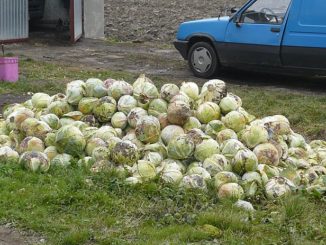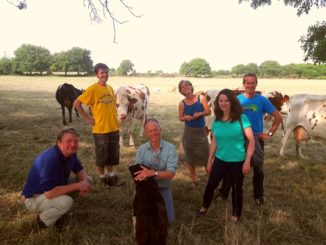
Manger Demain (Eating Tomorrow) is a strategy and an organisation in Wallonia, Belgium aiming to coordinate, link and facilitate local and regional initiatives engaged in sustainable food. The work of Manger Demain was one of many inspiring examples presented at the Marburg Sustainable Food Systems gathering co-hosted by ARC2020, kollektiv von MORGEN and the Arbeitsgemeinschaft bauerliche Landwirtschaft last November as part of the Rural Europe Takes Action – Germany project*.
Adopted by the Walloon Government on November 30, 2018 and voted unanimously by the Walloon Parliament in April 2019, Manger Demain provides the region with a global vision, a working methodology and a targeted work plan on a priority theme for four years until 2024. This article gives an insight into how Wallonia is mobilising the players in the catering industry around sustainable canteens.
By Lyse Bauduin, Manger Demain
Sustainable canteen meals: a guarantee of large-scale resilience
For many years, the transition of our food system has been cited as a major challenge to guarantee our food sovereignty. In Belgium and elsewhere, angry farmers have taken up the issue since the start of 2024. One of their demands: to be able to make a decent living from their passion!
Unfortunately, we’re a long way from achieving this, in more ways than one. According to the FAO’s annual report for 2023, externalities arising from our current food system are still not sufficiently considered for effective and regenerative policies to be implemented.
These externalities we can call the hidden costs; they may involve the exploitation of natural resources like depletion of water resources or impoverishment of land. Or they might not consider environmental impacts, like nitrogen and greenhouse gas emissions, loss of biodiversity, water and soil pollution, etc. There can also be health impacts, like non-communicable diseases linked to dietary patterns or even social impacts like poverty, undernourishment, and malnutrition. And, of course, as mentioned above, the overall economic fragility of the agricultural sphere. According to the FAO, these costs amount to more than 12,000 billion dollars a year, or more than 10% of global GDP.

Significantly increasing the sustainability of meals served in canteens
Supporting sustainable canteens is one way of rethinking our food system and making it more resilient, inclusive and sustainable. With this goal in mind, Wallonia is mobilising the players in the catering industry around these issues, through the Green Deal for Sustainable Canteens.
Every day, 200,000 hot meals are served in Wallonia’s mass catering sector, a major challenge given the quantities produced, the diversity of the audiences reached, the ability to spread change, and the multi-dimensional approach. One aim of the project is to experiment with, promote, and develop sustainable food in the kitchens of municipal services of all types (schools, hospitals, prisons, retirement homes, daycares, company restaurants, etc.).
Built using the objectives of the “Towards a sustainable food system in Wallonia” reference framework, the project’s actors work with products that are local and in season, fair-trade, respectful of the environment and animal welfare, healthy, balanced, and tasty, accessible, and inclusive, and aim to reduce food waste.
By committing to the project, canteens are pursuing a dual objective: sourcing locally and obtaining the “Label Cantines Durables” (an official recognition awarded by Wallonia). To achieve this, they will benefit from 18 months of support from the Manger Demain organisation to help them overcome the obstacles they encounter. This support can come through on-site assessments, collective training courses, the support of a legal expert on public procurement or the dissemination of best practices that emerge from the community of signatories to the project. Financial support is also offered, particularly for sourcing food locally.
One of the main obstacles identified by those involved in this Green Deal is the difficulty and in some cases the impossibility, of resolving the equation that consists of reconciling accessibility for users and fair remuneration for suppliers
Quality food comes at a price. Local producers and short distribution channels are committed to producing quality food, and to do so they deserve to be properly remunerated for their work. On the other hand, canteens offer meals to an extremely varied public, including people on the margins of society for whom this is sometimes the only meal of the day. So, it’s essential to keep prices affordable for as many people as possible. Against this backdrop, the “Local on your plate” (“du local dans l’assiette”) scheme was launched. This is a financial advantage granted to canteens; they can increase the proportion of local and sustainable products on their menus without passing the higher cost onto the consumer. |
Next stop: a sustainable food system in Wallonia
Created in 2019 by the Walloon Government, the Manger Demain organisation, dedicated to the food transition in Wallonia, implements various sustainable food initiatives entrusted to it by the Walloon Region. These include helping canteens make sustainable food choices, ensuring the coherence of food relocation projects, supporting the emergence and structuring of Food Policy Councils, and setting up “helping hand” initiatives to facilitate access to sustainable food for all.
The team’s core business is to facilitate local initiatives, create links, and support actors in their transition.
To create a strong link between production and food, the Manger Demain organisation is part of the ASBL SOCOPRO, alongside the Collège des Producteurs: a strategically essential link if we are to respond to food issues while remaining in tune with the realities of agricultural production.
*The Rural Europe Takes Action – Germany project is supported by the Robert Bosch Stiftung.
More
Marburg Gathering | Building Bridges for Future-Proof Food Systems
Letter From The Farm | Cooking With The Lights Off – Ingredients of Rural Resilience




